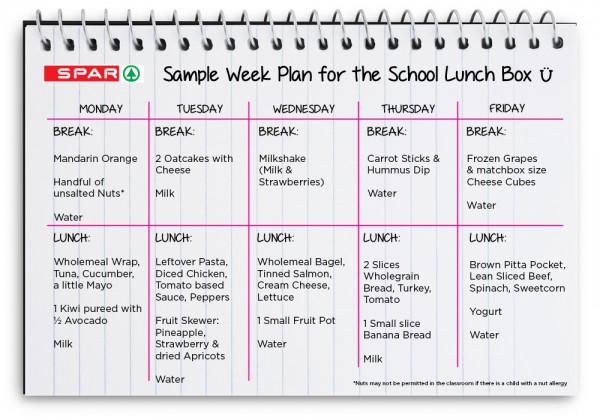
SPAR Better Choices Kids
Healthy Eating for Kids!
Healthy eating at home and school is essential for young children as it is a time of rapid growth and development. Eating healthier foods helps children to concentrate and learn in school. Eating well also gives your body the energy to perform your best at sport. If we establish better dietary choices as children, these positive habits will ensure we grow up to become healthier teenagers and adults.
Tips for a healthy lunchbox!
One third of a child’s food consumption occurs during school hours, therefore it’s a great opportunity to include as much good nutrition as possible into the packed lunch.
Eat The Rainbow
Aim to include at least 2-3 different colours in your lunchbox e.g. red peppers, green cucumber, purple plums etc. The more colours you include, the more vitamins and minerals are consumed, which help to prevent sickness.
Variety is key
If you eat a ham sandwich every single day then you may be missing out on other nutrients and over time you will become bored of the same food. It’s best to vary the types of sandwich fillers, fruits etc so that the packed lunch is nutritionally balanced and interesting. It is worthwhile investing in a good lunchbox; some have individual compartments to keep foods separate, prevent leaks and soggy sandwiches!

A Balanced Lunchbox Includes:
A healthy carbohydrate e.g. wholegrain bread, pitta pockets, rye crackers, oat cakes, a wrap, wholemeal bagel or cooked pasta, quinoa or couscous. Carbohydrates give energy for play, sports and also aids learning in school.
Two dairy products e.g. a yoghurt, cheese sticks, cheddar cubes, cottage cheese or 200ml milk. In Ireland, 1 in 3 Irish children don’t consume enough calcium for strong bones and teeth. The need for dairy foods increases from the age of 9 years old as the bones stretch and strengthen during the growth spurt.
A serving of protein-rich food e.g. lean meat (chicken, ham, turkey slices or leftover roast beef fillings to sandwiches), tinned fish, hard boiled eggs, hummus or a snap pot of baked beans for strong muscles.
At least one serving of fruit – chopped fresh fruit or bite size dried fruit.
At least one serving of vegetable or salad – some salad in a sandwich, raw carrot sticks or a flask of homemade vegetable soup. Fruit and veg help to prevent illness and give you lots of energy.
A drink – it’s best to keep to water or milk. Pure unsweetened fruit juice (not from concentrate) or no added sugar cordial are suitable. Fruit juice should be diluted with water. Dehydration can cause tiredness and affect your concentration or sports performance. It is essential to sip drinks regularly throughout the day, 1 hour before sport, 100-150mls every 15-20 mins during exercise and continue drinking after sport.

